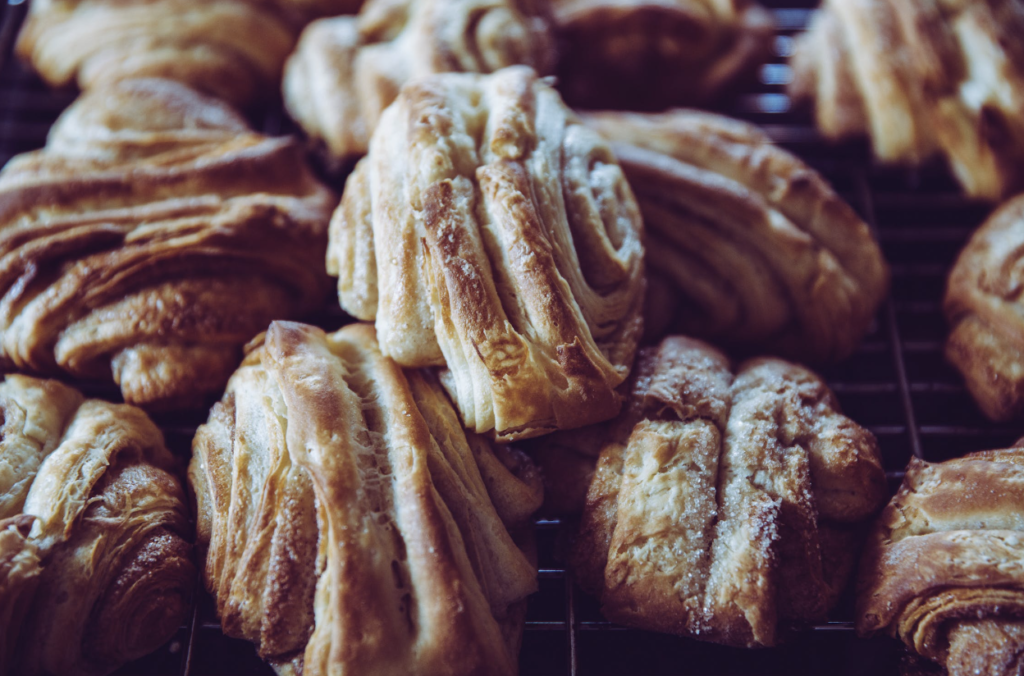On the couch with his friends, Jimmy watches a commercial. Two brothers bicker over the last Pillsbury croissant at a family gathering. Oh, did you want that?
Yeah!
Okay, we’ll split it. This is half.
Oh, that is not half!
It is so half!
Just when peace seems impossible, Mom emerges from the kitchen like an angel from some forgotten heaven and gifts the table with a fresh basket of warm, buttery Pillsbury croissants. Guys! More Pillsbury croissants!
“Whoa,” Jimmy says.
“For real,” says his friend, Bev, from the other end of the couch. “We should make some one night.” She tilts her entire body in his direction, but Jimmy doesn’t pay attention. They’ve been friends for years, on either side of puberty, and she can tell his mind is different lately. “I have to go,” he says, rising from the couch. Dan, sitting between them, finds the abruptness funny. He imagines Jimmy rushing off into the night in search of croissants.
Straight from Dan’s house, Jimmy drives to the supermarket. It’s already closed. He drives to the cheaper supermarket two towns over, but they won’t let him in. As the glass doors lock for the night, he stares at the jammed gumball machine that once stole his quarter.
Everything is closed. Still, he’d rather not go home. Better to lean back in his old Civic. Listen to the commercials on the radio.
Shortly before dawn, a few cars pull up around his. Green-vested people emerge to open the store. Jimmy follows them in. Dazed, he wanders through the dairy aisle until he’s found them: those colorful cardboard tubes. The ghostly doughboy stares up at him, arms outstretched, ready to be vored.
As she passes the kitchen, Mom spots Jimmy bent over a pan. “Making croissants?” she asks.
“Yep,” Jimmy says, still in the clothes he went out in last night. “I saw the commercial.”
Yawning, she reaches for the coffee maker. “Save me one, will you?” She’s on her way out the door as he slides them in the oven.
Twelve minutes at 300 degrees and Jimmy’s croissants are golden brown. He pulls them out of the oven, weighs one with his hand. He likes how the bread burns his palm. In his memory of the commercial, ribbons of steam twist off the croissants as Mom sets them down on the table. This is what he pictures as he closes his eyes. Then, feeling savage, he bites off more than half. He expects his mouth to smolder, but the croissant goes down without a fight. It becomes a part of him too easily.
He stops chewing. Feeling robbed, though unsure of what, he panics. Something is missing. He spits what’s left of the glob of bread in the trash, looks around the kitchen. In the pan, 11 fresh croissants wait to be eaten. But he doesn’t want them anymore.
Jimmy dumps himself onto the couch, wakes up the television. He waits for the commercial, certain it will come. It will re-enchant him, he thinks, and all his hard work will pay off.
It comes, at last, between segments of Good Morning America. The family glows in their holiday wear. Brothers in red and silver. Mom in a green dress with white polka dots. As they pass around dishes, loading up their plates, the final croissant glistens in the basket. Over the din of bickering and clanking silverware, Jimmy’s stomach unclenches. It’s the bustle, he thinks. The bustle breathes splendor into lifeless bread.
Soon he’s seated in the dining room, debating the fairest way to split a croissant among himself. “Oh, that is not half,” Jimmy says.
“Are you kidding?” Jimmy counters. “That is clearly half!”
Here he is: getting up, making his way to the kitchen, and picking up the basket of Pillsbury croissants. He carries them into the dining room, announces to no one: “Guys! More Pillsbury croissants!”
It does nothing for him.
Jimmy spends the rest of his morning at The Salvation Army. He buys himself a musty red shirt like the one the younger-looking brother wears. He finds a sweater-vest, candlesticks, and a great deal on a green dress. It smells fresh. He fills a cart back at the supermarket, spends the last of his money.
What goes on a turkey? Dill weed, he thinks. Sure. Clove bud. Celery seed. He doesn’t nibble as he cooks.
It’s late when Mom comes home, but the table is set, the candles lit. “Well now,” she says. “Someone’s been busy. What did I do to deserve all this?”
It’s just Jimmy and Mom, of course. But they can make it work, he thinks. Mind revving in his skull, he tries not to get ahead of himself. “I got this for you,” he says, plucking the green dress off the banister. Mom’s face tightens with concern. “Maybe you could wear it now? And then you could bring me the basket in the kitchen?”
Mom stares at Jimmy. It’s not the worst dress, she thinks. She sees nothing obviously wrong with it, or with a hardworking mom getting treated to dinner. But as she fails to wheedle a good explanation out of her son, her doubts engulf her. “I feel like the victim of a prank here,” she says.
“No,” Jimmy says. “It’s just something I want to do.”
Something about it feels heinous, but she doesn’t have it in her to uncover what. “You know,” she says, “I already ate. And I couldn’t sleep last night. I really need a nap. Could we rain check this?”
Jimmy looks devastated. Somehow this makes her all the more certain of the bullet she’s dodged. Upstairs she takes a Percocet, climbs in bed, and stares at the ceiling.
Jimmy sits down at the dining room table. The sight of his feast exhausts him. The musk of his red, collared shirt starts getting to him. He doesn’t usually wear shirts with collars. It feels heavy around his neck.
He calls his friends. Dan says he’s game for free food, can gather the crew. Jimmy feels his pulse quicken under his wrists.
“So glad you could make it,” he greets Dan. He works out a seating plan that reflects the commercial’s—Pete, already balding, gets the father’s seat at the end of the table. The Rolfs, with their matching polos, can be the cousins who the camera never catches face-on. “Dan,” Jimmy says, handing his friend the sweater-vest he’d been wearing earlier. “You can be my brother.” Dan slips it over his T-shirt without question. “This is fucking awesome,” he says, eyes on the sweet potato pie. They’d all gotten high in anticipation.
“What about me?” asks Bev.
“Bev…” Jimmy begins. They’ve been friends for so long. He remembers peeing himself on the trampoline in her backyard, and how she never told anyone. Ever since, his instinct has been to keep her at arm’s length, along with his shame, and suddenly he feels so foolish for it. “I’m just so happy you’re here,” he says. His fingers brush her hip as he leads her to the kitchen, shows her the dress hung over a chair.
Bev isn’t hungry, didn’t smoke with the rest. Studying his red collar, that domestic flair, she can feel the appeal of Jimmy’s vision. She wants to bring it to life, to get her line right. She only has one, but she takes it seriously. As everyone else laughs, samples the room-temperature dishes, Bev stands alone in the kitchen, rehearsing in her head.
“Oh, that is not half,” Dan exclaims. Dan breaks character with his knowing smile, but Jimmy is satisfied with his performance.
“Are you kidding?” Jimmy replies. “That is clearly half!”
And then, right on cue, Bev emerges from the kitchen. Everyone turns to watch.
She looks grown-up in her green dress, enters with a mother’s poise. She carries her croissants like a basket of light, buttery babies. They are her duodecaplets.
She doesn’t pause for dramatic effect. She says it just the way Jimmy coached her: proud, but not showy. Sweet, but sincere: “Guys! More Pillsbury croissants!”
She sets them on the table, right where Jimmy told her. He lifts the best croissant from the basket, holds it up for close inspection. It’s still warm from reheating. It’s as good as it’s going to get.
But his eyes well up.
His friends exchange nervous glances, all except for Bev. Bev stays in character, rests a hand on his shoulder. “What’s wrong, dear?”
He swats the duodecaplets off the table. They tumble and crumb all over the floor.
“Jimmy!” Bev says. “What’s gotten into you?”
They never eat them, he finally realizes. It all fades to black before anyone’s taken a bite.
Bev holds Jimmy against her waist and strokes his hair. She has never consoled a boy in this way, but in the dress, she is emboldened. Though everyone else looks eager to leave, none dare say it out loud. They just sit in silence as Jimmy weeps. “I’m so sorry,” Bev says. “I’m so, so sorry.”
He clenches the green fabric.
Dan, meanwhile, meditates on his hunger. He wants a slice of that pie before they go, but he wills his hands to stay in his lap. Dry mouthed, starving, he starts thinking of the commercial. He imagines scholars of the future studying it, this ancient TV stuff—millennia from now, when humanity will satiate itself with pills or something. Will they divorce our shows from all the sweaty close-ups of fats and carbohydrates that interrupt everything, punctuating every cliff-hanger? Or will they see what Dan suddenly suspects—that hunger is the only story, and all else adornment?

Mike Nees is a case manager for people living with HIV in Atlantic City. His stories are featured in The Baltimore Review, The Greensboro Review, The Forge Literary Magazine, and elsewhere. He is the host and cofounder of the Atlantic City Story Slam series. (mikenees.com)


Comments are closed.